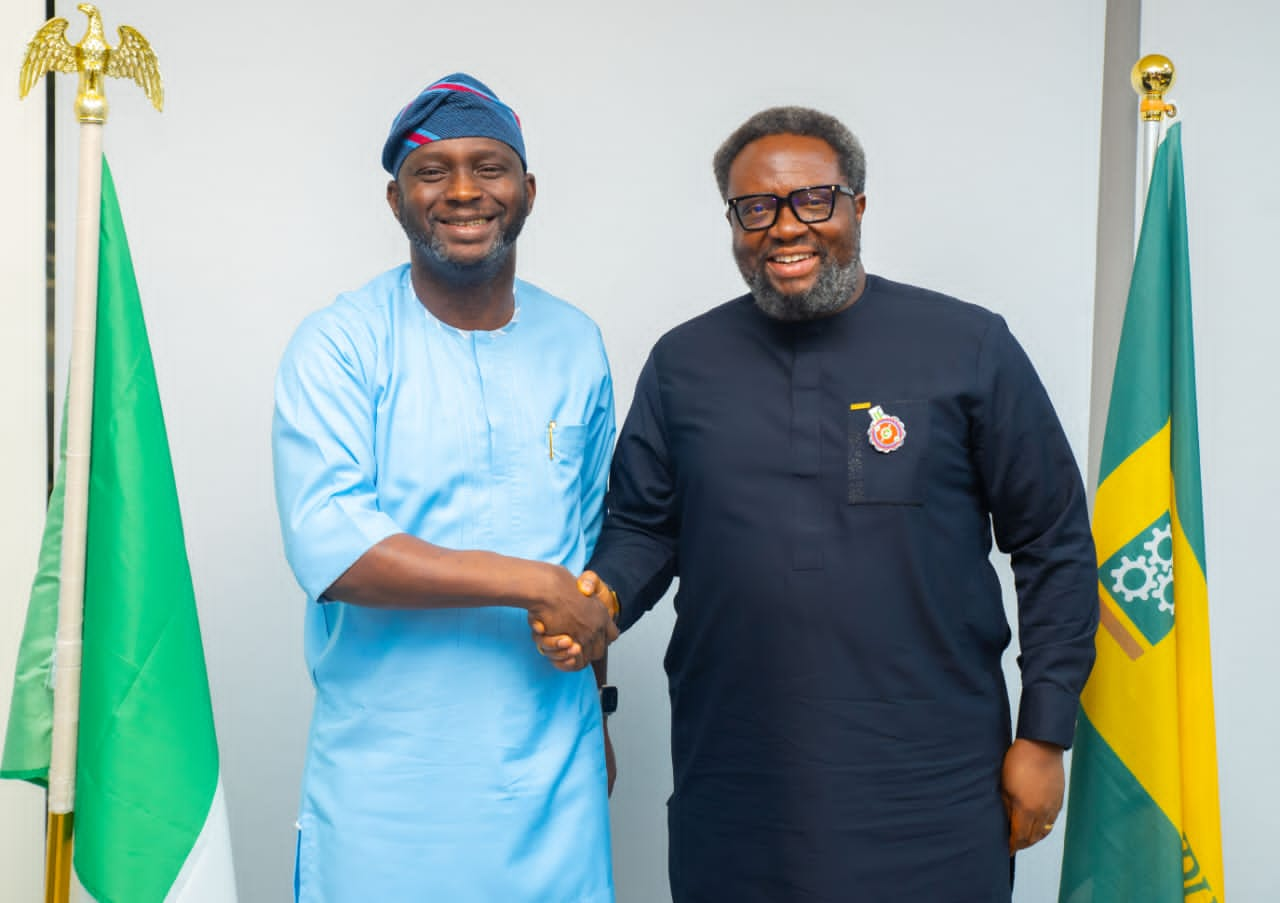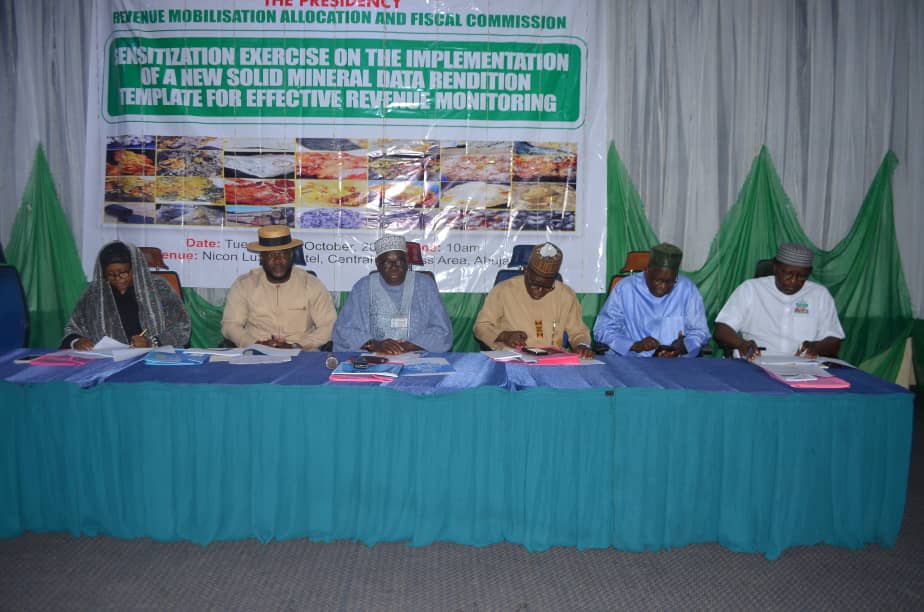Business
RMRDC, BoI To Partner On SMEs Intervention , Technologies Processing

Joel Ajayi
Raw Materials Research and Development Council (RMRDC is seeking the direct support of Bank of Industry to assist SMEs as well as Intervention funds to develop processing technologies to boost the Country’s local raw materials industrial inputs and prevent post-harvest losses.
This was disclosed by the Director-General, Prof. Nnanyelugo Ike-Muonso when paid a working visit to the Managing Director of the Bank of Industry (BoI), Dr. Olasupo Olusi, in Lagos Island, Lagos State.
While speaking, the DG stated that, the aim of the meeting was for both organizations to explore areas of collaboration in driving industrial development through targeted projects funding and technological interventions.
He described the meeting as being very strategic, highlighting the synergy between the role of BoI in providing financial support for industries and that of RMRDC in focusing on sourcing, development and utilization of local raw materials for industrial inputs.
DG However, made two key request which includes, Direct support to SMEs at the cluster level and Intervention funds to develop processing technologies and equipment for value- addition and more importantly, to prevent post-harvest losses.
RMRDC boss noted that RMRDC had recently developed a comprehensive database of resource endowments in the country which have been categorized based on SMEs characterization, while using the information to cluster small-holder business owners and operators, including agro raw material-producers, artisanal miners and others in the solid minerals sector.
Prof. Nnayelugo Ike-Muonso also pointed out that RMRDC currently operates the largest machine and equipment development facility in West Africa, located in the RMRDC Research and Demonstration Plant Complex in Abuja.
According to him, the RMRDC was not seeking research funding, but intervention funds to catalyse critical projects capable of enhancing productivity and efficiency in several agricultural value-chains and mineral sectors of the economy.
In his response, BoI Managing Director, Dr. Olasupo Olusi heaped huge praises on the efforts of the Council in promoting the development of industries through local raw materials utilization.
He highlighted the criteria for funding which includes project based lending, cluster-based product programmes and special intervention funds.
Dr. Olusi emphasized the need for a holistic approach to the value-chain intervention projects and reiterated that BoI primarily funds private-sector projects and not government agencies.
Prof. Ike-Muonso assured him that, RMRDC has an ongoing collaboration with Unilever Plc and various stakeholders to boost Country’s local raw materials for industrial inputs.
The DG also seized the opportunity to inform the MD of a Bill being sponsored by RMRDC in the National Assembly, to ensure that no primary raw material is exported out of the country unless at least 30% value-addition is achieved. This is to boost domestic processing capacity, create jobs, and protect resources.
While he urged BoI to support this initiative, being a key stakeholder in the industrial sector of the economy
In his contribution the Council’s Director, Industrial Plant and Equipment Department, Engr.E. I. Kwaya reiterated Council’s immediate need for support in process development to enhance value-addition and reduce wastages from the farm gate to the market.
He cited an example of onions, for which Nigeria is the second largest producer in Africa, with 2 million metric tonnes a year, only after Egypt.
However, Nigeria still imports onions at an estimated cost of about ₦35 billion, due to post-harvest losses.
Engr. Kwaya noted that the Council is partnering with a private manufacturing plant in Sokoto which currently produces 100kg of onions powder daily, but with some intervention can be upscaled to 500kg per day.
This, he said would require about ₦150 million to install an onion dryer and lyophilizer for processing raw onions into flakes and powder. The same, also applies to other crops such as tomato, ginger, etc.
Other project ideas including the procurement of freeze-dryer, which is also used in the pharmaceutical and food industries for processing produce into value-added products and a spray-dryer, currently being imported from China, for which RMRDC has the capability to reverse-engineer and adapt to our local environment for utilization.
Business
RMAFC Unveils New Data Rendition Template For Solid Minerals

Joel Ajayi
The Revenue Mobilization Allocation and Fiscal Commission, in conjunction with the Federal Ministry of Solid Minerals Development, has introduced a new solid minerals data rendition template for effective monitoring of revenue from the solid mineral sector in Nigeria.
Speaking during a one day sensitisation exercise on the implementation of the new template on Tuesday in Abuja, Chairman of the Commission Dr. Muhammed Bello Shehu OFR who was represented by the Chairman of the Solid Minerals Monitoring Committee of RMAFC at the occassion reiterated the Commission’s commitment to promoting the diversification of the Nation’s revenue sources in line with the Renewed Hope Agenda of President Bola Ahmed Tinubu GCFR, which aims to harness the country’s revenue potentials from other key sectors of the economy such as solid minerals, tourism, manufacturing and the blue economy.
The Chairman who underscored the importance of the new template said, “The implementation of the new data rendition template could not have come at a better time, given the current economic realities the country is facing.
The need to diversify our national revenue sources cannot be overemphasized, especially considering the nation’s over-dependence on hydrocarbon revenues, which are often affected by fluctuations in the international oil market, as well as challenges such as crude oil theft and vandalism.”
Dr. Shehu disclosed that, in line with its constitutional mandate as enshrined in the 1999 Constitution of the Federal Republic of Nigeria (as amended), the Commission had conducted two nationwide solid mineral revenue monitoring exercises in 2016 and 2022 aimed at boosting revenue generation from the mining sector. He added that the exercises had considerably improved the level of revenue generation from the sector.
He, however, lamented that despite the growing scale of activities in the country’s mining sector, only a negligible amount was being remitted to the Federation Account. This, according to him, was largely due to inadequate and ineffective monitoring of mining operations.
He therefore emphasized his determination to make sure that the Commission under his leadership work assiduously to ensure that all revenues due to the Federation Account from the mining sector were fully and promptly remitted into the Federation Account.
The new data rendition template, he explained, was designed to capture and manage relevant information such as the quantity of minerals produced, details of producing companies and their locations, as well as licenses, fees, and permits paid by mining companies.
The Chairman assured that the proper utilization of this data rendition template will enhance transparency and accountability by ensuring that mining operations and revenues are effectively tracked and managed.
In his remarks, Hon. Ibrahim Shettima, Chairman, Solid Minerals Monitoring Committee and Federal Commissioner representing Niger State in the Commission stated that the event was organized to bridge identified gaps to engender the timely and accurate rendition of revenue data on a state-by-state basis by relevant government agencies and operators in the solid minerals sector.
Speaking further, Hon. Shettima explained that the exercise aimed to establish an independent, reliable data platform for the Commission and serve as a credible source for comparison and policy decision-making.
Other stakeholders such as Director Mining Inspectorate, Federal Ministry of Solid Minerals,Engineer Imam Ganiu, D.G Mining Cadestre Office, Engr. Obadiah Nkom and the President of the Miners Association of Nigeria Mr. Segun Ayanleke acknowledged that Nigeria has the potential to be a key player in the global mining industry if the sector is efficiently and effectively managed. They, therefore, called for proper implementation of policies around the sector so as to achieve optimal results. They also advocate for stronger synergy between government and private stakeholders in the sector.
The high point of the event was the presentation of papers by resource persons on the general overview of the global and nigerian mining sectors, assessment of revenue contribution using data rendition, overview of the functions and activities of the Federal Ministry of Solid Minerals Development (FMSMD) as a major economic driver and the functions and activities of the Mining Cadastre Office (MCO).
Papers were also presented on the role and experience of the Miners Association of Nigeria and the new data rendition template as a requirement for accurate and Timely Data Reporting in the Solid Minerals Sector.
-

 Featured6 years ago
Featured6 years agoLampard Names New Chelsea Manager
-

 Featured5 years ago
Featured5 years agoFG To Extends Lockdown In FCT, Lagos Ogun states For 7days
-

 Featured6 years ago
Featured6 years agoChildren Custody: Court Adjourns Mike Ezuruonye, Wife’s Case To April 7
-

 Featured6 years ago
Featured6 years agoNYSC Dismisses Report Of DG’s Plan To Islamize Benue Orientation Camp
-

 Featured4 years ago
Featured4 years agoTransfer Saga: How Mikel Obi Refused to compensate me After I Linked Him Worth $4m Deal In Kuwait SC – Okafor
-
Sports3 years ago
TINUBU LAMBAST DELE MOMODU
-

 News9 months ago
News9 months agoZulu to Super Eagles B team, President Tinubu is happy with you
-
Featured6 years ago
Board urges FG to establish one-stop rehabilitation centres in 6 geopolitical zones
